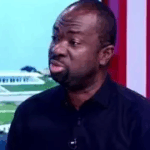
Member of Parliament for Manhyia South, Nana Agyei Baffour Awuah, has described the effects of the Gbenyiri conflict as “dire,” warning that the humanitarian and security challenges demand urgent attention.
Speaking on Joy FM’s Newsfile program, the MP said the fear among residents is understandable because they know their environment better than anyone else.
“It speaks to a certain orientation, which is a result of their knowledge of where they find themselves. They know the place more than we all do, and so typically, they are right to have that kind of feeling, that sense of fear,” he explained.
He added that security agencies must work with other state institutions to help ease those fears and restore calm.
“It is for the security agencies working with other agencies of state to gradually ease them out of that fear; otherwise, like my brother said, the consequences are dire. Beyond the humanitarian crisis, you’re also looking at food issues and food security issues, and so in that regard, I think there’s a lot of work to be done,” Mr. Awuah said.
The Manhyia South legislator warned that the multiplicity of ethnic groups in the north makes the situation especially sensitive, stressing that even small triggers could easily escalate tensions.
“We need to be very careful when we are handling some of these matters. Already, the multiplicity of ethnic groups, diverse ethnic groups in the northern region, and some parts of the country always make matters very sensitive. And so the little triggers may cause some of these things,” he cautioned.
Mr. Awuah further noted that politicizing ethnicity worsens the problem and called for continuous security presence and sensitization rather than one-off interventions.
The MP also criticized how political events often attract more national attention than violent conflicts, citing the recent Akwatia by-election.
“This thing happened just about the same time as the Akwatia election was taking place. Yet the kind of attention they received was not as significant as the by-elections. To some extent, it highlights how we pay attention, for instance, to politics, to the detriment of various sectors of our national lives,” he said.
On the humanitarian front, Mr. Awuah expressed concern about the displacement of children and farmers, saying it is already undermining education and livelihoods.
“Children are going to be back in school, but because of this conflict, they cannot go back to school. The farmers have also been displaced… So the effect is dire, and we all know this,” he lamented.
Concluding his remarks, the MP urged Ghana to pay greater attention to its internal crises instead of focusing only on external humanitarian situations.
“As a nation, whilst we always prepare for refugees from other countries, we don’t seem prepared to deal with situations like this, even in our own country. And it is very unfortunate that we seem to be concerned about others, you know, and not ourselves. We need to start paying attention to ourselves, particularly in places where these things are prevalent, and then make sure that there’s a continuous process to ensure that proper integration is done so that they don’t reoccur,” he concluded.
The Gbiniyiri clashes, which have left thousands fleeing into Burkina Faso and Côte d’Ivoire, represent one of Ghana’s deadliest internal conflicts in recent years.